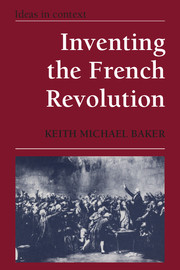Book contents
- Frontmatter
- Contents
- Acknowledgments
- Introduction
- 1 On the problem of the ideological origins of the French Revolution
- Part I French history at issue
- 2 Memory and practice: politics and the representation of the past in eighteenth-century France
- 3 Controlling French history: the ideological arsenal of Jacob-Nicolas Moreau
- 4 A script for a French revolution: the political consciousness of the abbé Mably
- Part II The language of politics at the end of the Old Regime
- Part III Toward a revolutionary lexicon
- Notes
- Index
2 - Memory and practice: politics and the representation of the past in eighteenth-century France
Published online by Cambridge University Press: 05 June 2012
- Frontmatter
- Contents
- Acknowledgments
- Introduction
- 1 On the problem of the ideological origins of the French Revolution
- Part I French history at issue
- 2 Memory and practice: politics and the representation of the past in eighteenth-century France
- 3 Controlling French history: the ideological arsenal of Jacob-Nicolas Moreau
- 4 A script for a French revolution: the political consciousness of the abbé Mably
- Part II The language of politics at the end of the Old Regime
- Part III Toward a revolutionary lexicon
- Notes
- Index
Summary
Memory, Michel Foucault has argued, “is actually a very important factor in struggle. … If one controls people's memory, one controls their dynamism. … It is vital to have possession of this memory, to control it, administer it, tell it what it must contain.” Recognition of this relationship between memory and political practice was by no means absent in France at the end of the Old Regime. Indeed, it was explained to Louis XVI on his accession – and with disarming simplicity – by one of the crown's most enlightened and innovative ministers, Henri Bertin. “The history and public law of a nation are based on the records,” Bertin instructed his sovereign:
It has been necessary to collect them in order to know them, and it was necessary to know them before acting.
In matters of government, the knowledge of facts was all the more important in that we have always seen great errors become the harbingers of great disorders, and those who have wished to trouble states have always begun by misleading peoples.
Bertin was not simply offering the statement of an abstract proposition. He was also defending a political strategy that he regarded as imperative for the crown to follow, given the political conditions with which it was now faced. Participants in the constitutional contestations that transformed the nature of French political culture in the course of the eighteenth century were to become increasingly conscious of the importance of the relationship between memory and political practice.
- Type
- Chapter
- Information
- Inventing the French RevolutionEssays on French Political Culture in the Eighteenth Century, pp. 31 - 58Publisher: Cambridge University PressPrint publication year: 1990
- 3
- Cited by

